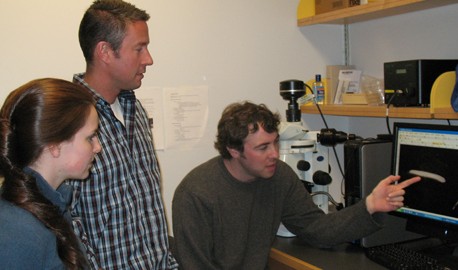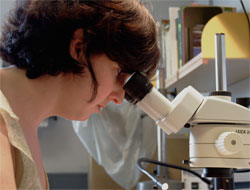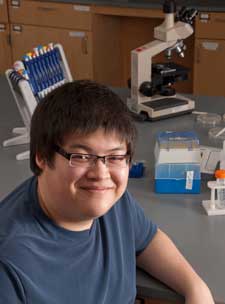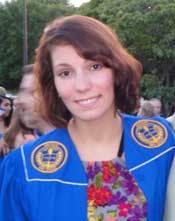
Since the days of the proverbial story of Issac Newton “discovering” gravity when a falling apple hit him on the head, it’s long been known that important scientific discoveries often happen quite unexpectedly. A finding in Assistant Professor Jason Pellettieri’s Stem Cells and Regeneration course may well be one such event. The course explores basic scientific concepts and ethical issues in the fields of stem cell biology and regenerative medicine, so Dr. Pellettieri has the students investigate the effects of environmental variables on regeneration in planarians (Schmidtea mediterranea), aquatic flatworms with a remarkable ability to regrow lost body parts.
“You can chop an adult planarian into hundreds of pieces and almost every piece will regenerate a complete new individual in just over a week, so these animals make ideal experimental subjects for non-science majors,” Dr. Pellettieri explained. “A few years ago, one group of students in the course found that prolonged sunlight exposure led to complete depigmentation of regenerating animals. Planarians are normally dark brown in color, but the sunlight-exposed animals turned completely white. Brad Stubenhaus, a student researcher in my lab, conducted a series of follow-up experiments that showed depigmentation can be triggered by intense visible light.” Therefore, Dr. Pellettieri applied for, and received, a $64,456 NH-INBRE grant to continue this important research.
A normal number of pigment cells is critical for human health. Skin melanocytes, for example, normally provide protection from the damaging effects of ultraviolet (UV) radiation, but stimulate the growth of too many melanocytes, and you’re a candidate for melanoma. You also need the right amount of retinal pigment epithelium cells to have normal eyesight. Losing these cells causes age-related macular degeneration (AMD), a leading cause of blindness. These conditions are increasing and effective treatments remain limited, so research that adds to the scientific knowledge of factors impacting pigment cell survival is vital.
Dr. Pellettieri and his students have succeeded in reproducing the depigmentation phenomenon under controlled conditions in the lab, and he will use the INBRE grant to determine how visible light exposure causes depigmentation at a cellular and molecular level. “Our preliminary data suggest that planarian pigment cells die when exposed to bright visible light for extended periods of time,” he said. “We think this is due to the generation of harmful molecules called reactive oxygen species (ROS) that can damage many different parts of the cell, including DNA.”
Other researchers have demonstrated that melanin, the pigment in human skin, generates ROS when exposed to ultraviolet (UV) radiation, and this effect has been linked to melanoma, the most deadly form of skin cancer. “That very important work adds to a large body of literature documenting the adverse effects of UV exposure, but we know relatively little about the effects of intense visible light on pigment cells,” Dr. Pellettieri said. “Our INBRE-funded research is addressing that gap in our knowledge. It’s always important to be cautious when trying to establish possible connections between research in lab animals and human biology, but if our results indicate that visible light can cause damage to pigment cells through the generation of ROS, this might raise some interesting questions about possible harmful effects of prolonged exposure to bright visible light (of course that wouldn’t be a problem for all of us living in New Hampshire most of the time!).”
Two other students, Emily Neverett and Jeanne LaFortune, are now working on this project with Stubenhaus. “They’ve already generated some very interesting data and, although we have a ways to go with this research, we think we’re on the right track in terms of our hypotheses about how depigmentation occurs,” said Dr. Pellettieri. “Brad and Emily both received funding from INBRE to support their research on this project over the summer, along with J.P. Dustin, who is doing research on a new project in my lab. INBRE has been tremendously helpful in allowing me to set up an undergraduate research program here at Keene State. Mentoring research students is an extremely rewarding part of my job and it’s really gratifying to receive support for that work.”








